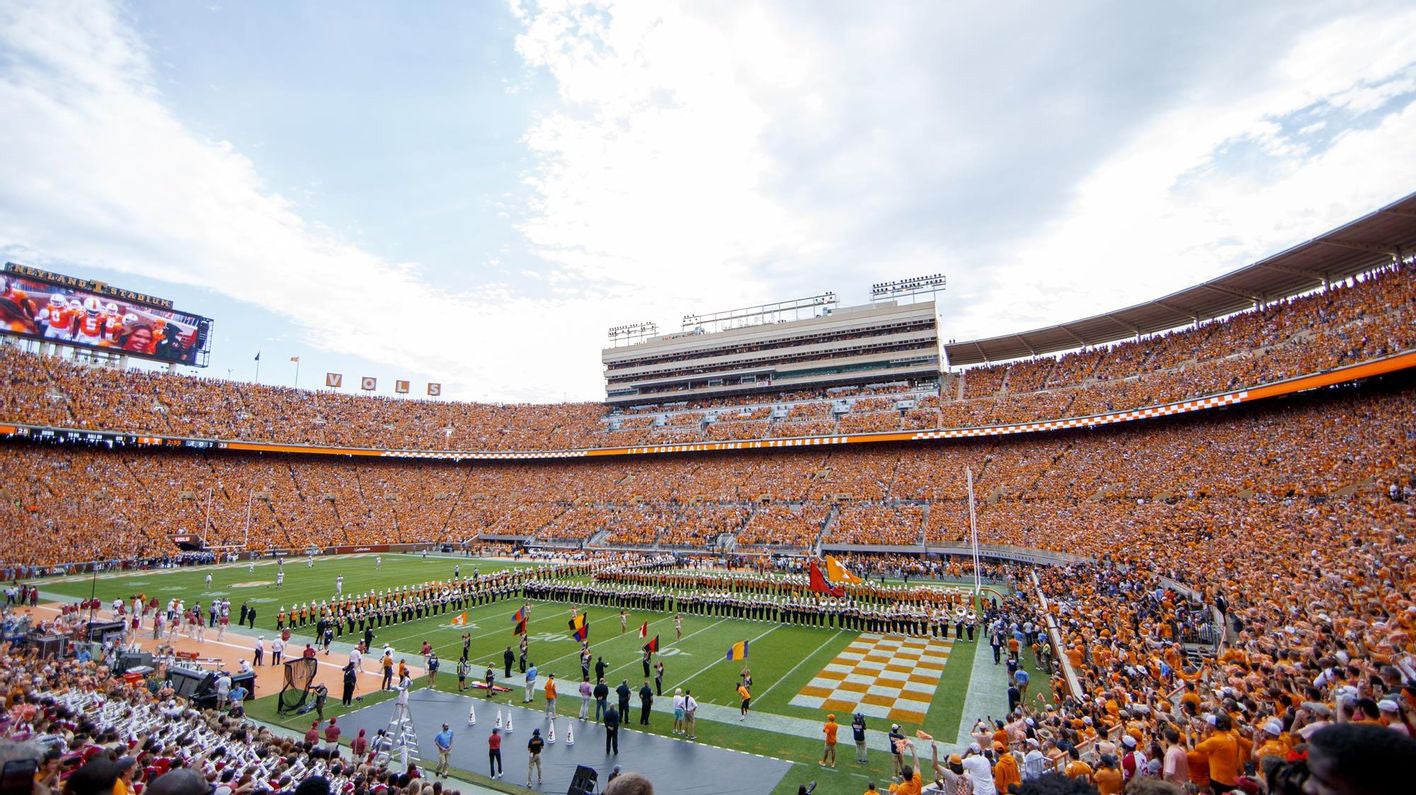Biggest wins in Neyland Stadium history
Published 4:35 pm Wednesday, October 26, 2022

- There have been many memorable wins in at Neyland Stadium over the years. UT Athletics photo
|
Getting your Trinity Audio player ready...
|
NEWS RELEASE
Since 1921, the Vols have been playing home football games on the field which is the ninth-oldest college facility. There has been a total of 634 games in the 101-year history of Neyland Stadium/Shields-Watkins Field. This year’s win over Alabama was the 482nd home victory at the historic venue.
Through the years, coaches, players and fans relish the memory of landmark Vol victories from the past. Here are some that come to mind listed in reverse chronological order:
Trending
Oct. 15, 2022: No.6 Tennessee 52, No.3 Alabama 49
Tennessee’s Jalin Hyatt recorded a historic breakout performance in the 2022 edition of “The Third Saturday in October,” racking up 207 yards on his six receptions, five of which he housed for touchdowns. Those five scores set a Tennessee school record and tied an SEC record for receiving touchdowns in a single game.
The top-six game featured a battle of unbeatens in the series for the first time since 1989 and marked the series’ sixth top-10 contest inside of Neyland Stadium.
In what was the 105th meeting between the schools, Tennessee snapped a 15-game skid to the Crimson Tide behind a 40-yard boot by the right leg of redshirt senior kicker Chase McGrath, sparking Big Orange pandemonium on a special Tennessee Saturday night.
Another major headline in the game was the marquee matchup between two Heisman contenders. Tennessee’s Hendon Hooker turned in a 21-of-30 effort for a career high of 385 yards passing and a career-best-tying five scores to firmly establish his position in the race for the nation’s top award. Alabama was led by reigning Heisman winner Bryce Young, who finished with 455 yards on 52 pass attempts and a pair of scores.
Nov. 14, 1998: No.1 Tennessee 28, No.10 Arkansas 24
Trending
Top-ranked Tennessee improved to 9-0 on the year with a rousing 28-24 victory over the Razorbacks of Arkansas to continue its perfect 1998 season. Down 21-3 in the second quarter and later facing a 14-point third-quarter deficit, the Vols scored the game’s final 18 points to battle back on a rainy afternoon and earn the win in dramatic fashion.
With one first down late in the fourth quarter, the Hogs could put the game on ice. That was until Arkansas quarterback Clint Stoerner stumbled and fumbled, and UT defensive end Billy Ratliff recovered the ball to set the game-winning drive in motion. The Vols took over on the Arkansas 43-yard line with 1:43 remaining in regulation, trailing 24-22.
Five consecutive rushes from sophomore running back Travis Henry culminated with his two-yard touchdown plunge to give UT a 28-24 advantage with just 28 seconds to go. Henry tallied 197 rushing yards on 32 carries for the day.
The win kept the Vols’ championship hopes and undefeated season alive. The rest is history as Tennessee went on to defeat Florida State in the first-ever BCS National Championship.
Sept. 19, 1998: No.6 Tennessee 20, No.2 Florida 17 (OT)
Tennessee’s home opener during the national title season was punctuated by a game-winning field goal in overtime by senior placekicker Jeff Hall, a memorable field storming and arguably the late, great John Ward’s most iconic call from his time as The Voice of the Vols.
Hall’s right-to-left field goal was kicked into the night sky through the same south end zone uprights and from the same hash marks, just one yard back of McGrath’s in 2022.
A then-UT-record crowd of 107,653 joined together along the banks of the Tennessee River for the 20-17 thriller, as the Vols ended a five-game skid to the Gators, holding Florida to -13 yards rushing.
Backed up to 3rd-and-23 from the Florida 38, quarterback Tee Martin scampered for a key 14-yard run to give senior placekicker Jeff Hall a much more manageable 41-yard field goal attempt, in which Hall booted through the uprights.
Florida had to settle for a field goal on the ensuing overtime possession and—as articulated by Ward—pandemonium reigned that night in Neyland.
“The kick is in the air and the kick this time is… NO-SIR-REE. NO-SIR-REE. Final score: Tennessee 20, Florida 17. Pandemonium reigns.”
The goal posts, once again, stood no chance against the sea of orange. Tennessee would go on to win the SEC Championship that year, along with the national championship crown.
Sept. 30, 1989: No.12 Tennessee 21, No.4 Auburn 14
A crowd of 95,341 filled Neyland Stadium as, during a late-September downpour, 12th-ranked Tennessee bested No. 4 Auburn, 21-14. The Vols rushed for a season-high 350 yards on 64 carries. Tennessee running back Reggie Cobb raced for a career-high 225 yards on 22 carries and was responsible for Tennessee’s first score of the day, finding the checkerboards from 79 yards out.
Freshman tailback Chuck Webb nearly pitched in 100 yards of his own, registering 93 rushing yards on 19 carries and a fourth-quarter touchdown to give Tennessee a 21-11 lead. As stellar as Tennessee’s offensive ground attack was, its defense was just as fierce in the run game, allowing a mere 29 yards on 31 attempts.
Sophomore linebacker Shazzon Bradley made one of the game’s biggest plays, intercepting Tiger quarterback Reggie Slack to set up Webb’s touchdown. The exuberant Vol fans stormed the field with a few seconds remaining in the game, as the goal posts were swiftly brought down by the fans.
The Vols would go on to win the SEC Championship and the Cotton Bowl that season, finishing 11-1 with a final national ranking of No. 5.
Sept. 28, 1985: Tennessee 38, No.1 Auburn 20
A dominant effort in the season’s second game resulted in unranked Tennessee overpowering top-ranked Auburn, 38-20. The Vols jumped out to a 24-0 lead by halftime, and that score remained true after three quarters. Each of Auburn’s 20 points came in the fourth stanza, as UT staved off the Tigers’ furious closing rally by adding two touchdowns of its own to the scoreboard, securing the monumental victory.
Tennessee limited 1985 Heisman Trophy winner Bo Jackson to 80 total rushing yards on 17 attempts, after Jackson had accumulated over 200 yards on the ground in each of his previous two outings. UT’s freshman back Keith Davis countered with 102 yards on 13 carries.
Senior quarterback Tony Robinson posted 259 passing yards and four touchdowns on 30 attempts in the win. Robinson would be named AP Offensive Player of the Week, with Tennessee’s Darrin Miller taking home SEC Defensive Player of the Week honors after his performance of seven tackles and an interception.
Vol fans swarmed the field and brought down the goal posts following the victory, before the Vols rose to No. 16 in the AP poll the following week. Tennessee would go on to win the SEC title and defeat Miami in the Sugar Bowl that season.
Oct. 16, 1982: Tennessee 35, No.2 Alabama 28
In an iconic 1982 coaching matchup, Johnny Majors and the Vols got the best of Bear Bryant and his second-ranked Tide, snapping Tennessee’s 11-game skid to Alabama with a 35-28 triumph.
With Alabama holding a 14-3 lead in the second quarter, the game’s turning point was sparked by Willie Gault’s 52-yard touchdown reception from Alan Cockrell, marking the Vols’ first touchdown of the contest.
Prior to Alabama’s comeback bid, the Vols stretched their advantage to two scores (35-21) in the fourth quarter. UT’s Mike Terry intercepted Alabama’s Walter Lewis in the end zone to snuff out the fire for the Tide with just 17 seconds remaining.
In the win, Gault set a new SEC record for career kickoff and punt return yardage, while Cockrell completed 18 of his 29 pass attempts for 192 yards and a pair of touchdowns. Tailback Chuck Coleman rushed for 139 yards and the fourth-period score that provided the Vols a two-score cushion with 7:21 remaining in the game.
Sticking with the common trend, the goal posts were ripped down by Vol Nation on that glorious Third Saturday in October.
Nov. 10, 1979: Tennessee 40, No.13 Notre Dame 18
Tennessee’s Hubert Simpson moved into the starting lineup and the Tennessee record book all in one day, sparking the Vols to an impressive victory over a top-15 Notre Dame squad, much to the delight of the 86,497—which was UT’s largest home crowd to date—that packed into Neyland Stadium on that cloudy November Saturday.
Simpson’s four touchdowns from his fullback position tied a UT record, as the junior netted 117 yards to overshadow Notre Dame’s great Vagas Ferguson, who totaled 88 yards on the ground.
Tennessee racked up 441 yards of total offense, but it was a goal line stand at the end of the first half that served as a decisive moment. Notre Dame had just scored and appeared headed for a third touchdown when Craig Puki and Chris Bolton blasted Ferguson inches short of the goal line.
The goal posts were torn down by Tennessee fans following this win.
Sept. 16, 1972: No.7 Tennessee 28, No.6 Penn State 21
An early September matchup between the Vols and Nittany Lions marked the first night game in the history of Neyland Stadium. Tennessee emerged victorious, 28-21, but the story really begins a year prior.
Following the Tennessee’s win over Penn State in 1971, Penn State head coach Joe Paterno implied that the game being played during the daytime rather than at night was a contributing factor to his team’s loss.
The very next season, in 1972, Tennessee installed lights in the stadium and the first home night game in program history would be against… Penn State.
The week two top-seven matchup saw the Vols jump out to a 14-0 lead after one quarter, with junior tailback Haskel Stanback punching in a pair of rushing touchdowns for UT. Stanback’s third rushing score of the day with under nine minutes remaining in the fourth quarter all but sealed the deal as he totaled 101 rushing yards in Tennessee’s 28-21 validating victory under the lights.
Dec. 4, 1971: No.12 Tennessee 31, No.5 Penn State 11
Tennessee toppled Penn State in the 1971 regular-season finale, 31-11, as the Nittany Lions were handed their first loss of the season and lost their 15-game winning streak.
Fm pre-game ceremonies until the closing whistle, it felt like Bobby Majors Day at Neyland Stadium, as the Vols’ All-America safety dominated play with electrifying kickoff and punt returns. The entire Majors family was honored before the opening kickoff, in recognition of their contributions to college football. Then, when the action began, Majors ran wild by returning two punts for 82 yards, including one touchdown, and scurried for 113 yards on two kickoff returns.
Penn State’s feared running attack was offset early when Conrad Graham snatched a fumble from out of the air and galloped 76 yards for a touchdown in the game’s opening quarter. The Vols’ record was brought to 9-2 following this victory, before going on to take down Arkansas in the Liberty Bowl.
Oct. 24, 1970: No.11 Tennessee 38, Florida 7
The Vols thrashed the Gators in Bill Battle’s first season at the helm in Knoxville, winning 38-7. The matchup also marked the return of Doug Dickey, serving as the head coach of Florida in 1970 after holding the reins at Tennessee from 1964-69.
Perhaps the most spectacular play in Tennessee’s conquest of Florida was Jackie Walker’s interception return of 19 yards for a touchdown, the second straight game in which the junior linebacker had scored with an airborne takeaway.
Emphasis on the ground game by Florida’s defense opened the passing gates for UT senior quarterback Bobby Scott, whose 385 yards through the air on 21 completions rewrote the Tennessee passing record set by Bubba Wyche in 1968. Scott, who fired two touchdown passes to Joe Thompson on the day, earned national honors for his performance.
Tennessee finished the year at 11-1, including a win over Air Force in the Sugar Bowl.
Oct. 19, 1968: No.8 Tennessee 10, Alabama 9
After Tennessee drove 63 yards and scored a touchdown on the game’s opening possession, it soon became a closely contested game. Richmond Flowers, who transferred from Alabama to Tennessee, scored the Vols’ only touchdown from a half-yard out.
Alabama, held for three quarters to a lone first-period field goal, initiated a valiant comeback effort in the closing moments. Scott Hunter’s passing carried the Tide 80 yards for a touchdown with a minute left. An ensuing two-point conversion attempt failed, leaving Tennessee on top by the final 10-9 margin. Still, recovery of an onside kick gave Alabama a chance for a last-gasp field goal try. Tennessee’s Jimmy Weatherford capped a brilliant performance by blocking the potential game-winning kick, preserving the victory on The Third Saturday in October.
Nov. 6, 1965: Tennessee 21, No.7 Georgia Tech 7
Tennessee’s first home win over a ranked opponent in the Doug Dickey era came against the seventh-ranked Yellow Jackets of Georgia Tech in 21-7 fashion late in the 1965 season.
On this day, Charlie Fulton enjoyed one of the greatest outings of his career, accounting for 133 total yards rushing and adding 108 yards through the air, completing eight of his 13 pass attempts.
The Big Orange defense accumulated three takeaways via interceptions during the contest, one of which was returned to the checkerboards by Harold Stancell for UT’s first touchdown of the game.
Tennessee went on to an 8-1-2 record and won the Bluebonnet Bowl over Tulsa, which was the first bowl appearance since 1957 and Doug Dickey’s first as head coach.
Nov. 7, 1959: No.13 Tennessee 14, No.1 LSU 13
The nation’s top-ranked LSU Tigers fell to the Vols in an early November matchup during the 1959 season.
Tennessee stopped Heisman Trophy winner Billy Cannon on a two-point conversion attempt that is now simply known as “The Stop.”
One of the greatest and most significant plays in Tennessee football history, The Stop came in the fourth quarter, as LSU attempted to take a 15-14 lead by opting for the two-point try. The Vols stuffed Cannon just short of the goal line to maintain the lead, one that would prove to be the final margin of victory.
Nov. 25, 1950: No.9 Tennessee 7, No.3 Kentucky 0
In what turned out to be a successful 11-1 season for Tennessee, a low-scoring affair favored the Big Orange in a heavy snow two days after Thanksgiving, shutting out the Wildcats of Kentucky, 7-0, in 1950.
Kickoff temperatures plunged to 12 degrees. The matchup featured a legendary coaching faceoff between Robert Neyland and Bear Bryant. Neyland never lost a game to Bryant, thanks in part to the Vols battling the conditions to earn this top-three victory. Tennessee concluded the season with a win over Texas in the Cotton Bowl.
Oct. 21, 1939: No.5 Tennessee 21, No.8 Alabama 0
The 1939 top-10 showdown of the Tennessee-Alabama rivalry held constant with Tennessee’s theme that year: not allowing a single point during the regular season. Life Magazine did a four-page spread on the game with George Cafego serving as the main attraction. Johnny Butler’s run of 56 yards for a touchdown is still regarded as one of the greatest broken field runs in Tennessee history and carried the Vols to the victory against the Crimson Tide.





